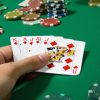Poker has produced some of the largest payouts in gambling history, with players winning massive sums in tournaments and high-stakes cash games.
The biggest poker wins came from players who understood the game at the highest level, whether through aggressive play, psychological dominance, or years of discipline in bankroll management.
These moments aren’t just about luck: they’re masterclasses in strategy, discipline, and expert decision-making. Let’s dive into the stories, tactics, and psychology behind these historic victories, offering insights into how players turned audacious risks into legendary paydays.
Unforgettable Moments: The Largest Poker Payouts Ever Recorded
Massive prize pools have defined poker’s most iconic tournaments, with millions of dollars at stake.
Players who claimed the biggest poker wins in history didn’t just rely on good hands—they outplayed opponents, capitalized on critical moments, and used advanced techniques to tilt the odds in their favour.
These wins are some of the most legendary moments in the game’s history.
Daniel Colman’s $15 Million Score
Daniel Colman shocked the poker world when he won the 2014 Big One for One Drop, earning $15.3 million.
However, what made his victory even more intriguing was his refusal to celebrate in the spotlight. Colman, known for his stoic demeanour, refused interviews and avoided media attention.
His approach was rooted in mathematical precision and hyper-aggressive bluffs. The win resulted from this assertive but controlled play, carefully balancing risk and reward. Colman managed to navigate a challenging field by focusing on exploiting opponent tendencies and adapting his strategy in real-time.
The prioritization of efficiency over showmanship showcased the mindset needed to secure one of poker’s biggest poker wins.
The $18 Million Hand: Antonio Esfandiari’s Legendary Big One for One Drop Win
Antonio Esfandiari made history when he won the 2012 Big One for One Drop tournament, securing a staggering $18.3 million payday—the largest single payout in tournament history at the time.
His path to victory was defined by fearless aggression, expert reads, and precise bet sizing. His ability to maintain composure and apply relentless pressure throughout the event helped him secure one of the biggest poker wins ever recorded.
The final hand saw Esfandiari holding 5♦5♠ against Sam Trickett’s Q♠6♠. With a board of J♦5♣2♥7♠8♣, Esfandiari’s set of fives held strong, sealing his win.
This bold move showcased his ability to weaponize table image, convincing rivals he held premium cards even when bluffing.
Jamie Gold’s Record-Breaking WSOP Main Event Win
Jamie Gold took the 2006 World Series of Poker Main Event by storm, winning $12 million—the largest Main Event payout in history. His relentless table talk and calculated aggression convinced rivals to fold winning hands, a tactic critics called “ruthless” but undeniably effective.
Gold used psychological pressure to manipulate players into making costly mistakes. His willingness to push all-in frequently forced weaker opponents to fold, giving him complete control over the game.
This psychological warfare, combined with his ability to control the table’s tempo, demonstrated how charisma could tilt odds in his favour—and ended up leading him to one of the biggest poker wins ever seen at the WSOP.
While his style drew controversy, it proved that dominating the mental game is as crucial as mastering the cards.
Sam Trickett’s $10 Million Payday
Sam Trickett secured one of poker’s largest payouts with a $10.1 million runner-up finish in the 2012 Big One for One Drop. His success came from a combination of fearless bluffs and calculated risks.
One of his most memorable hands involved an aggressive all-in bluff that forced a stronger opponent to fold. Trickett’s ability to read situations and commit to high-pressure moves made him a major force in high-stakes tournaments, leading to one of the biggest poker wins ever recorded.
How Justin Bonomo Became Poker’s All-Time Money Leader with Massive Wins
Justin Bonomo’s rise to the top of the all-time money list was no accident. He maintained a disciplined mindset, always seeking small edges rather than relying on high-risk plays. His methodical playstyle contributed to some of the biggest poker wins in history.
His calculated approach and ability to adapt to different game formats helped him secure multiple high-roller victories, including a $10 million win at the 2018 Big One for One Drop.
Bonomo’s edge came from his deep understanding of game theory optimal (GTO) strategy and his ability to shift gears depending on his opponents. This success highlights the importance of blending math with knowledge.
The Role of High-Stakes Cash Games in Producing Poker’s Biggest Winners
Not all poker fortunes come from tournaments. Some of the biggest poker wins have occurred in private high-stakes cash games, where players can win millions in a single session.
Legends like Phil Ivey, Tom Dwan, and Patrik Antonius have built their bankrolls in these games by mastering deep-stack play and psychological warfare.
Unlike tournament play, cash games require players to manage swings while maintaining a long-term edge. The ability to outplay opponents in unstructured, high-pressure environments has led to some of poker’s most jaw-dropping wins.
How These Players Used Bankroll Management to Win Millions
Winning big means nothing without proper bankroll management. Many of the players behind the biggest poker wins in history have stayed successful by maintaining strict financial discipline.
Esfandiari and Bonomo avoided financial ruin by capping buy-ins at 5% of their net worth. This discipline allowed them to weather variance—a key factor in poker’s unpredictability.
Avoiding unnecessary risks, playing within their means, and knowing when to move up in stakes allowed these pros to sustain their careers.
For example, Daniel Negreanu famously sets stop-loss limits, quitting sessions after losing a predetermined amount. This approach prevents tilt and ensures players live to fight another day. Bankroll management isn’t glamorous, but it’s the backbone of sustained success in a game where even legends face brutal downswings.
Instead of chasing short-term results, they built their wealth by making consistent, smart decisions over time.
The Psychological Tactics That Helped These Players Dominate the Game
Mental toughness plays a crucial role in poker success. The biggest winners understand how to manipulate opponents, control their emotions, and remain composed under pressure.
The biggest poker wins often hinge on mental warfare. Phil Ivey’s stoic “poker face” unnerves opponents, while Daniel Negreanu’s hand-reading prowess—he once correctly guessed a rival’s hole cards based on a flicker of eye contact—exposes weaknesses.
Jamie Gold’s table talk, however, remains the gold standard. By narrating hands and feigning uncertainty, he manipulated opponents into revealing tells. These tactics prove that poker isn’t just a card game; it’s a battle of wits where psychological dominance can trump even the strongest hands.
Some players use table talk to extract information, while others rely on an unreadable poker face. Controlling tilt, staying patient, and capitalizing on opponents’ frustrations have all contributed to securing the biggest poker wins in history.
Breaking Down the Hands: The Strategic Moves That Led to Historic Wins
Behind every massive poker win is a series of well-executed hands. The top players analyze board textures, opponent ranges, and betting patterns to make profitable decisions.
Strategic thinking plays a huge role in executing a perfectly timed bluff or trapping an aggressive opponent with a strong hand. Studying the key hands that led to the biggest poker wins offers valuable insights into high-level poker strategy.
The Biggest Online Poker Wins: Who Struck Gold on the Virtual Felt?
Online poker has its own legends, with anonymous players scoring some of the biggest poker wins. In 2020, “punting-peddler” won $5.3 million in a single session on GGPoker, exploiting multi-tabling and HUD stats to dominate weaker opponents.
Some of the biggest poker wins have come from online tournaments like the World Championship of Online Poker (WCOOP) and the Sunday Million. The anonymity of online play allows for aggressive strategies rarely seen live.
Skill and strategy translate across all formats. While online poker lacks physical tells, mastering betting patterns and digital reads has allowed these players to claim enormous prizes.
Success sometimes hinges on data—tracking betting patterns and adjusting ranges in real-time.
Not All Strategy, But Not At All Luck
Poker’s biggest winners didn’t rely on luck alone (if at all). Discipline in bankroll management ensures longevity and psychological tactics tilt close battles in your favor.
The biggest poker wins teach us that success requires more than cards. Adaptability separates champions from the rest; Esfandiari shifted gears mid-tournament, while Bonomo mastered GTO to stay unpredictable.
Studying these legendary wins offers valuable lessons for any aspiring player. Refine your strategies and embrace the grind. After all, the next historic win could be yours.
















